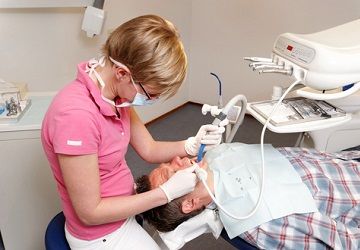The Care-Focused Approach to Driving Hygiene Profitability
The easiest way to push your dental hygiene team toward more profitability is simple: Have them put the best oral health interest of patients first. Sometimes, the best treatment option may not be the most economical. But if it is the treatment option that yields the best oral health outcome, then it is the correct treatment for the hygienist to suggest.

How do you make your hygiene team more productive and profitable? The answer more than likely aligns with the mission statement of your practice: You make your hygiene team more productive and profitable by focusing on what is in the best interest of your patients.
The very drivers of production and profitability involve having your hygiene team guide patients to the care and services they need most. The challenge is that hygiene teams often get in their own way of providing the best care and services.
RELATED: More Advice from Dentist’s Money Digest’s Financial Experts
· VIDEO: Putting Your Financial Priorities in the Right Order
· Donate Your IRA Required Minimum Distribution to Charity, Tax Free
· How to Use the New Buy-and-Hold Investing Method
For example, a long-term patient who is faithful about twice-per-year cleanings and exams suddenly shows signs of gum disease. The hygienist decides against discussing scaling and root planing out of fear of alarming the patient. Instead, the hygienist just does a regular cleaning. Was the best service provided for the patient?
When hygiene teams worry too much about delivering bad news or recommending treatment that may involve out-of-pocket costs, they stop short of providing the best care possible. Fortunately, these obstacles can be overcome.
The best performing hygiene teams constantly challenge themselves to make the same recommendations for patients in the chair as they would for members of their own family. This point of view shifts the focus to tried and true treatment protocols and it helps the hygienist consider all relevant options. If the faithful patient has gum disease, for example, then scaling and root planing is discussed since it is in the patient’s best interests. If the doctor and hygiene team believe adult fluoride is in the patient’s best interests, then this service is recommended even if insurance does not cover it.
Hygiene teams are best served to keep considering what they would recommend for members of their own family since hygienists are much less effective as mind readers. Worrying too much about insurance coverage or alarming the patient stands in the way of the patient relationship. Just as family members express questions and concerns when greeted with surprising news, patients will as well, and most will be comforted by the hygienist’s sincerity and commitment to the best care possible.
The obstacle of cost is best addressed by focusing on the value of the service provided. It is important to remember that value is not expressed in clinical terminology since people rarely value what they do not understand. For example, telling patients they have perio issues, deep pockets, and furcation involvement will never communicate the same value as two simple words: gum disease. Building value involves speaking plain English and using words such as gum disease, infection and bacteria.
Building value also means understanding that patient push back is not a cause for concern. Instead, questions indicate that patients need reassurance about what was suggested, and standing behind treatment recommendations is an important facet of reinforcing value. Remember that patients rarely have unlimited funds for dental treatment and everything else affecting their budget, and this is the main reason they need reassurance. Once patients understand the importance and value of dental treatment, they usually find a way to work it into their budget.
Profitable hygiene teams are critical for the success of a dental practice. Fortunately, profitability is linked to providing great care and always doing what is in the best interests of your patients.
Mike Smith is a principal at Fluence, a dental CPA and consulting firm located in Portland, Oregon that represents more than 200 dentists. Mike is a member of the Academy of Dental CPAs (www.ADCPA.org), an organization that represents more than 9,000 dentists. Discover more Dentist's Money Digest Personal Finance coverage here.
ACTIVA BioACTIVE Bulk Flow Marks Pulpdent’s First Major Product Release in 4 Years
December 12th 2024Next-generation bulk-fill dental restorative raises the standard of care for bulk-fill procedures by providing natural remineralization support, while also overcoming current bulk-fill limitations.